NEWSNIGHT LIVEpublished at 10:35
Wednesday 24th June
Stories today include the Greek debt crisis, and looking ahead to the critical EU leaders meeting.
Occasional updates and analysis from the Newsnight team
Wednesday 24th June
Stories today include the Greek debt crisis, and looking ahead to the critical EU leaders meeting.
A man whose greatest strength was his weakness
 Chris Cook
Chris Cook
Newsnight Policy Editor
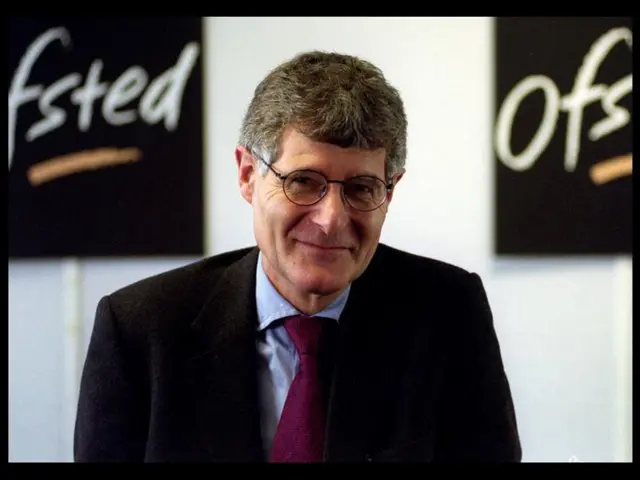 Image source, PA
Image source, PAI've written about the former chief inspector of schools, whose death was announced today.
 Lewis Goodall
Lewis Goodall
Newsnight producer
Don't think it's just the booze cruisers and the tourists affected by the Calais strike. One of the sadder victims is the Labour Deputy Leader contest as one of the main contenders is stuck in Brussels:

Let's hope it doesn't go on too long...
 Marc Williams
Marc Williams
Newsnight Election Producer
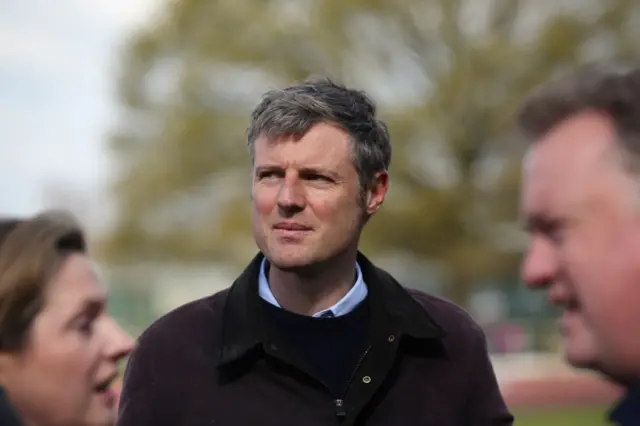 Image source, Oli Scarff/Getty Images
Image source, Oli Scarff/Getty ImagesZac Goldsmith is as of today officially a candidate to be Boris Johnson's successor as Mayor of London after winning an "endorsement" vote from his Richmond Park constituents.
The result, external (a 79% thumbs up) has drawn some snarky comments from his opponents, pointing out that the turnout of just short of 26% would fail the Government's proposed 50% threshold for industrial action.
Nonetheless, there is a definite sense that Labour insiders see Goldsmith as a clear threat to their chances of retaking the capital.
This is borne out by looking at the odds being offered by the bookies. Goldsmith has straightaway entered the market as favourite, ahead of established candidates such as Tessa Jowell and Sadiq Khan.
Here is what market aggregator Oddschecker has at the moment:
 Image source, Oddschecker.com
Image source, Oddschecker.comGoldsmith is out on top despite the fact that Labour are odds on to win the contest, such is the extent to which he seems to be weighted to outperform his own party. The next Tory on the list is former Enfield North MP Nick Dubois, who has today endorsed Goldsmith.
As with all of these markets, there are many people on this list who are not and who will not be candidates. Disappointingly for Labour, two of their official candidates, Gareth Thomas and Christian Wolmar, are below Nick Clegg and Ed Balls.
What does this tell us about who is going to win in 2016? Well, the General Election results in London show that Labour, all things being equal, should be in a good position to win in 2016. They increased their share of the vote by 7%, gained 7 seats and established a 9 point lead over the Conservatives city-wide.
If you look at the charts below, you'll see that Labour increased their share of the vote and number of seats to around the level of 2005, just one year after Ken Livingstone won London for Labour.
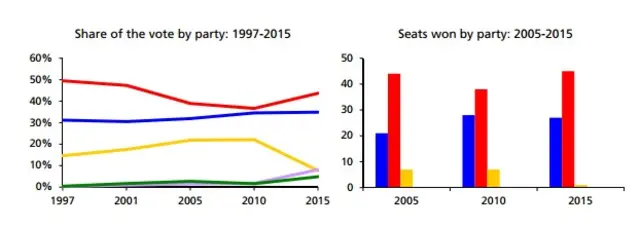 Image source, House of Commons Library
Image source, House of Commons LibraryThe counterpoint to this is that personal appeal can have a decisive effect in a Presidential-style race. That's how Boris Johnson managed to win in 2008 with 43% of the vote in the first round: that was double the Tory London vote in 2005 and still around 14% more than the Tories got there in the 2010 General Election.
Can another eco-friendly Old Etonian repeat the trick in 2016? Looking at the odds, he might be the Tories' only hope.
By Gabriel Gatehouse @ggatehouse
 Image source, AFP
Image source, AFPSkulls of victims of Rwandan genocide
The arrest of the Rwandan spy chief, Karenzi Karake, in London has drawn attention to the tip of a very large and contentious iceberg.
An “insult to our collective conscience,” Rwanda’s High Commissioner to the UK, Williams Nkurunziza, called it. What did he mean by that? Andrew Mitchell expressed it more bluntly, when he told the Today Programme that the Spanish arrest-warrant was “enacted by supporters of the genocidal regime in Rwanda”.
This goes to the heart of the matter. Set aside for a moment the legal merits of the Spanish investigation (about which doubts have been expressed). What is going on here is a battle for control of history, for control of the narrative of what happened during and – more particularly – in the aftermath of the genocide.
The official narrative in Rwanda is this: when the genocide began, the world stood by and did nothing as an estimated 800,000 people were slaughtered by genocidal mobs bent on wiping out the Tutsis. This is true. The official narrative then says that, in the absence of any international action (hence the High Commissioner's reference to “collective conscience”), the Rwandan Patriotic Front (RPF), a Tutsi-led guerrilla force, came in and stopped the genocide. This is also true. Thirdly, the official narrative states that, through almost superhuman efforts of discipline, the RPF, under Paul Kagame, unified the country and turned Rwanda into a functioning state, an African success story. This is also largely true.
And this is why western politicians love Kagame. What unites Tony Blair and David Cameron? They both know that when they decide to spend hundreds of millions of pounds of British aid money on Rwanda, it will get spent well and they will see results.
But there is another narrative. Not a counter-narrative – nothing can diminish the horror of the Rwandan genocide. But a parallel narrative. Stopping mass murder was not achieved through hard work and saintliness alone. It was a war. In the course of that war, and in its aftermath, mass killings took place, in some cases of civilians. Political assassinations were carried out. They continue to this day. This is not part of the officially accepted narrative.
In Rwanda, I have spoken to people who have told me terrible stories: of watching family members slaughtered in front of their eyes. When those killings took place at the hands of Hutu genocidaires, these stories are aired and discussed in public, as part of Rwanda’s efforts towards rebuilding their society. But when those alleged killings took place at the hands of those who stopped the genocide, at the hands of the RPF, which now runs Rwanda, it is a taboo subject. Not taboo in the sense that it’s not socially acceptable to talk about it. Taboo in the sense that, if you do talk about it, you’re likely to end up in jail, or worse.
The case of Karenzi Karake threatens to shine a light on this narrative. And that is why the response from the Rwandan government and its supporters has been so swift and so furious.
Or how to get people interested in justice reforms
 Ed Brown
Ed Brown
Newsnight producer
The minister for a middle ranking department makes a speech in which he says he will implement the efficiency reforms recommended by a report released six months previously, and written by a well respected judge. The reforms themselves appear to be backed by the sector's establishment, and include things like using IT better.
This is the sort of story that generally finds its way to page seven of the national newspapers and is discussed at length in the trade press.
Except, it would seem, today. The government's justice reforms made it onto several front pages, and are riding high in the news agenda.
Why? Well, it's true that the measures appear to be worthy. But they're not obviously more radical than, say, much of what the government did in the cabinet office in the last Parliament.
Perhaps people are fascinated by justice? Not obvious from IPSOS Mori's most recent issues index:
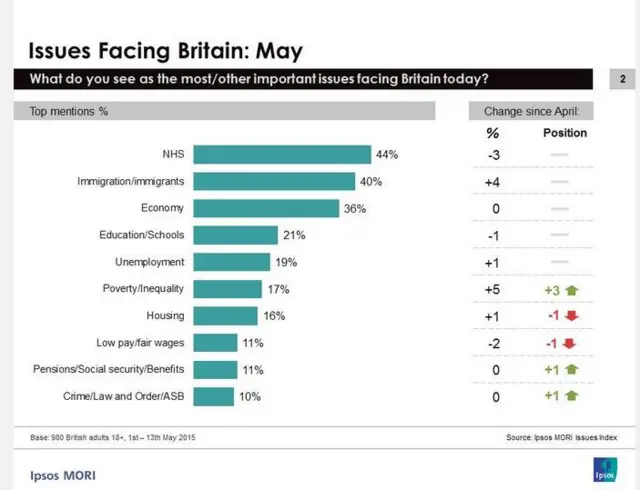 Image source, IPSOS Mori
Image source, IPSOS MoriNo. I think the answer lies in this chart from Google Trends, which gives us a fairly unscientific measure of the interest they've observed in various justice ministers and the author of the report (Brian Leveson - remember him?) over the last five years. You'll notice that Leveson barely registers when he publishes recommendations for exactly this set of reforms in January 2015:
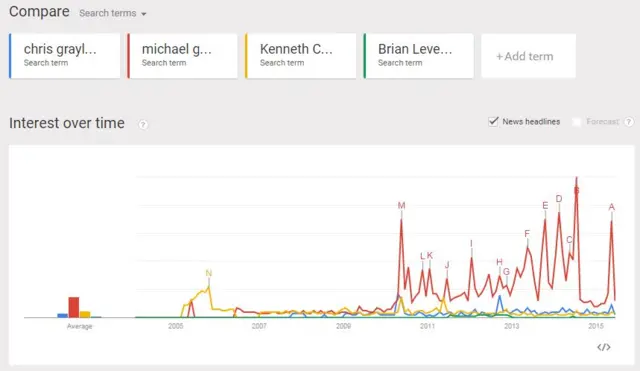
My suspicion is that the excitement over today's justice reforms isn't really because people are fascinated by court processes and IT procurement. It's all about the public (and in that I include the media) fascination with the messenger, this man:
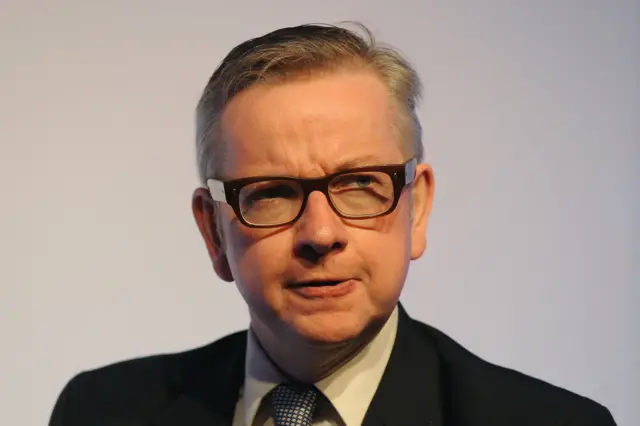 Image source, PA
Image source, PAMichael Gove
 Lewis Goodall
Lewis Goodall
Newsnight producer
Michael Gove is presenting himself as the defender of England and Wales' poor in his new incarnation as Justice Secretary. Today in a speech he has warned that the "creaking and outdated" justice system is letting down the poor most and that efficiencies and more modern practice of work is urgently required.
This may well be true. But it's worth bearing in mind just how substantial the transformation in the primary vehicle of providing the poor with access to the justice system has been since 2010.
In 2012 the government passed the Legal Aid, Sentencing and Punishment of Offenders Act. This removed funding from entire areas of civil law, including:
The changes also affected criminal cases, removing £215m of funding from criminal legal aid. This prompted a mass walk-out of criminal barristers for the first time in their history. Indeed the changes to legal aid were the most dramatic since its introduction sixty five years ago.
The act didn't come into force until 2013 so we now have a full year of its effects. According to MoJ figures, external compared to the "acts of assistance" (legal speak for legal aid, essentially) under the last year of the last government 2009/10 there has been an overall fall of 39 per cent in the number of acts granted. Within this, criminal cases have fallen by 14% whilst in the civil justice area the volume of legal aid has fallen by nearly two-thirds, as the graph below shows.
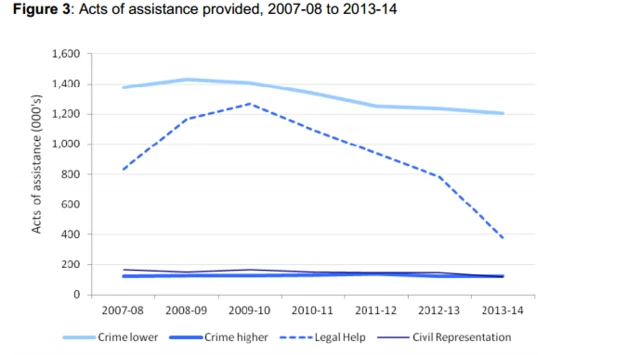 Image source, DoJ
Image source, DoJVolumes, in terms of the number of acts of assistance, were at their highest in 2009-10. Since this peak volumes have fallen by just over 39 per cent; within this reduction the criminal legal aid area has reduced by almost 14 per cent but the majority of the fall has come from the civil justice area which has reduced by almost two-thirds over this period. To put some numbers on that, in 2013/14 alone 500,000 fewer cases received legal aid compared with the year previously. Within that, social welfare and family law have been most affected, with drops of 80% and 60% respectively. Divorce in particular has become a far more expensive affair (no pun intended) and there has been a rise in the number of litigants in person (people having to represent themselves in court).
We live in a time of deep public retrenchment, money is very tight. But it might be worth thinking about just how much defendants turning up on time and the introduction of technology can compensate for this retreat from the state from the courtroom. No matter how efficient the system is if the poor or people on middle incomes can't get access to it in the first place, it won't make much difference.
 Emily Maitlis
Emily Maitlis
Newsnight Presenter
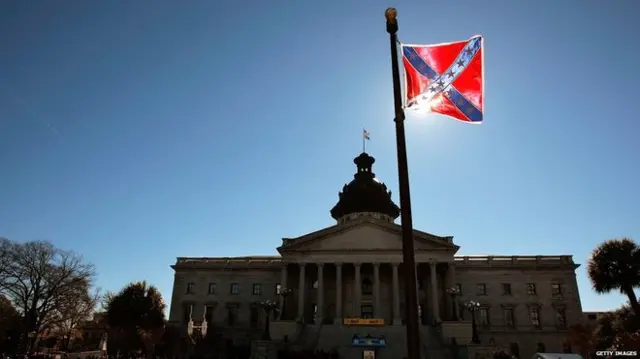 Image source, Getty Images
Image source, Getty Images"You wont find a Confederate flag flying in this city no more". I am in the French Quarter of Charleston, the day after nine black members of a church have been shot dead as they studied their Bible, by a young white man trying to "start a race war’. The words are spoken by Leanne, a white woman who runs a cookie stall in the place they now call "The Old Slave Market".
She has just answered my question. I have been trying to find a flag – which has long been a symbol of controversy. It represents the region that seceded from the Union in 1861 – but was raised in the early 1960s by those protesting racial desegregation in the South. And I have been searching for one to film. Overnight, that sense of unease at its symbolism has sharpened. And although Charleston will no longer fly it, just a hundred miles or so away in the state capitol, Columbia, it flies proudly over the state house. In a weird political compromise, it flies beside, no longer on it. Change comes slowly to this part of the world.
Or has done till now. Last night, in an about turn. The Governor, Nikki Hayley, herself of Indian-American descent, called for it to come down. As ever, politicians in the South walk a wary line – caught between supporting "heritage" - which is an important part of the Southern way – and not being afraid to condemn its racist past. But today – the republican legislator says she plans to introduce a bill to remove the flag at the capitol building, particularly since that very building has seen vigils to the victims of the racially motivated attack.
Perhaps the will is there now to enshrine this change in law. But don’t expect anything to happen quickly. Many may remember how Senator John Mccain came unstuck – exactly here, a full fifteen years ago. In April 2000, shortly before bowing out of the Republican presidential primary, he expressed regret for not speaking out about the flying of the Confederate flag over the South Carolina state capital. He admitted fearing he would lose the primary there if he had done so. Has enough changed now to tell politicians they can call for the flag to be banned, and not face election purdah for forever more?
There are 12 Republicans seeking their party’s nomination for President next year. Not a single one has explicitly called for the flag to be removed from South Carolina’s statehouse – some like Mick Huckabee have even said this is "not an issue for a presidential candidate". Demographic changes and shifting attitudes towards race may mean they are out of step with America. But the Republican primary contests are overwhelmingly dominated by white males.
Nikki Hayley’s shift in her own position is perhaps a recognition that the state of South Carolina needs unity right now. But the legal process to ban the flag could still be long and tortuous. It needs two thirds majority assent of the general assembly. And legislative time to make the case the flag is no longer welcome there.
 Duncan Weldon
Duncan Weldon
Economics correspondent
The deal is almost done. Just three trip wires remain.
The creditors may still demand more or find, in their ongoing technical assessment. But, whilst some European Finance Ministers are talking tough - there is an appetite for a deal amongst most.
The second trip wire is the Greek banks. Whilst a delay in the deal could trigger a fresh outflow of deposits, that risk (for the first time in weeks) now looks contained. The ECB is content to keep provided support and the lower risk of a Greek Euro exit or capital controls should provided some reassurance to anxious depositors.
The real risk is politics. This is the third trip wire.The deal that has been reached is a tough sell in Greece. The Government will point to an easing of austerity, they'll argue that much of the fiscal work is being done by tax rises rather than spending cuts and they'll say that the "red lines" haven't been crossed.
Whilst that's all true, the red lines have been skirted around (pensions aren't being cut but early retirement is being scaled back, there's a chunky rise in VAT on the way and a deeply unpopular property tax is staying), there is no commitment to debt relief and a much of Syriza's manifesto will now go unfulfilled.
The sense in Athens today is that the deal is achievable. Whilst much of Syriza's activist base and many MPs will be unhappy, many others think the government - in difficult circumstances - has made gains.
Amongst the wider public a Euro exit - the real alternative - would have been deeply unpopular. But in eight months time, when the new deal expires, achieving another fix will be harder. The Greek economy is in a weak position. And it's about to be hit by large tax rises. That won't help.
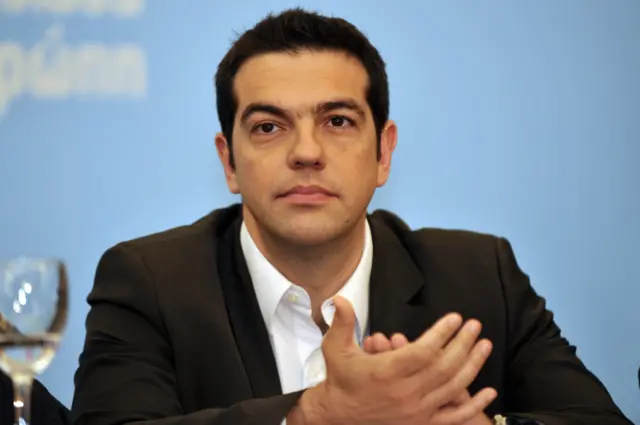 Image source, AFP/Getty Images
Image source, AFP/Getty ImagesGreek Prime Minister, Alexis Tsipras
Tuesday 23rd June
Stories in the news today include the Greek debt crisis and Justice Secretary, Michael Gove's speech on the justice system.
By Vinnie O'Dowd
 Image source, None
Image source, NoneKarenzi Karake
Rwanda’s intelligence chief, wanted in Spain for war crimes, has been arrested in London.
BBC Newsnight has learned that the Metropolitan Police’s Extradition Unit arrested Karenzi Karake at Heathrow Airport on Saturday.
The Metropolitan Police confirmed that the 54-year-old Rwandan appeared before Westminster Magistrates Court after being detained under a European Arrest Warrant. He has been remanded in custody until June 25.
Karake is Director General of Rwanda’s National Intelligence and Security Services. Karake fought during the 1990-1994 Rwandan Civil War and later served as Rwanda's intelligence chief between 1994 and 1997, and then as deputy commander of the African Union peacekeeping force in Darfur.
Karake is one of 40 Rwandan commanders named in an indictment issued in 2008 by Spanish investigative judge Andreu Merelles.
The Spanish court alleges that while acting as head of military intelligence after the genocide Karake, ordered a number of massacres.
He is also accused of ordering the killing of three Spanish nationals working for the NGO Medicos del Mundo.
The arrest of Karake will potentially bring the British government into conflict with an important regional player with whom it has maintained close ties. In 2013 Rwanda was the 18th biggest recipient of UK aid.
Karake's is the first arrest of a major RPF figure under charges brought abroad. Tonight Jordi Palou-Loverdos, the lawyer representing nine Spanish massacre victims, told Newsnight: "We hope in the name of the victims that this time justice will be provided and Karenzi Karake will soon be delivered to the Spanish court to have a fair trial, where he can defend himself. And we hope that political or other interests will not neutralise the place for justice, truth and reparation."
 Marc Williams
Marc Williams
Newsnight Election Producer
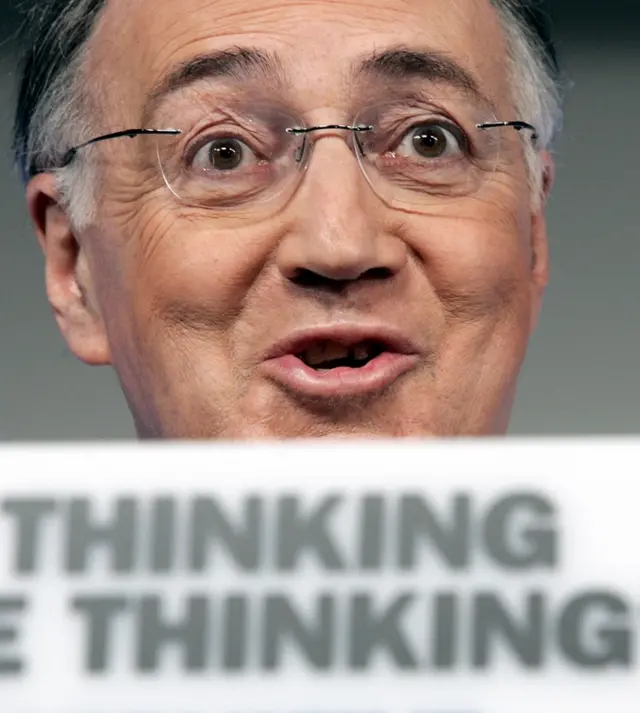 Image source, AP/Adam Butler
Image source, AP/Adam ButlerMichael Howard launching the Conservative manifesto in 2005
Welfare, in particular tax credits, is dominating the political agenda today. Following the Prime Minister's speech on the issue, it has reappeared in the House of Commons this afternoon. Pressed by Labour MPs, Iain Duncan Smith has explicitly said that tax credits were boosted by the previous Labour government "as a way of trying to buy votes".
He said:
"Quite interestingly, it appears just before every election the Labour government increased tax credits dramatically. In 2004 by 60 per cent, just before the 2005 election again by 7.2 per cent and then just before the 2010 election both by 14.4 and by 8.5 per cent."
This is a pretty powerful allegation, but it is interesting to note that it isn't one that the Conservatives made at the time. I've dusted off my old (electronic) copy of the Conservative Campaign Guide for the 2005 General Election. This is the internal document drawn up by the party's policy boffins to help candidates fight the election.
Was this filled with potent political invective against the scurrilous folly of Labour pumping ever more money into the tax credit system? Well, no. Here's what was included in the section entitled "Problems with Tax Credits":
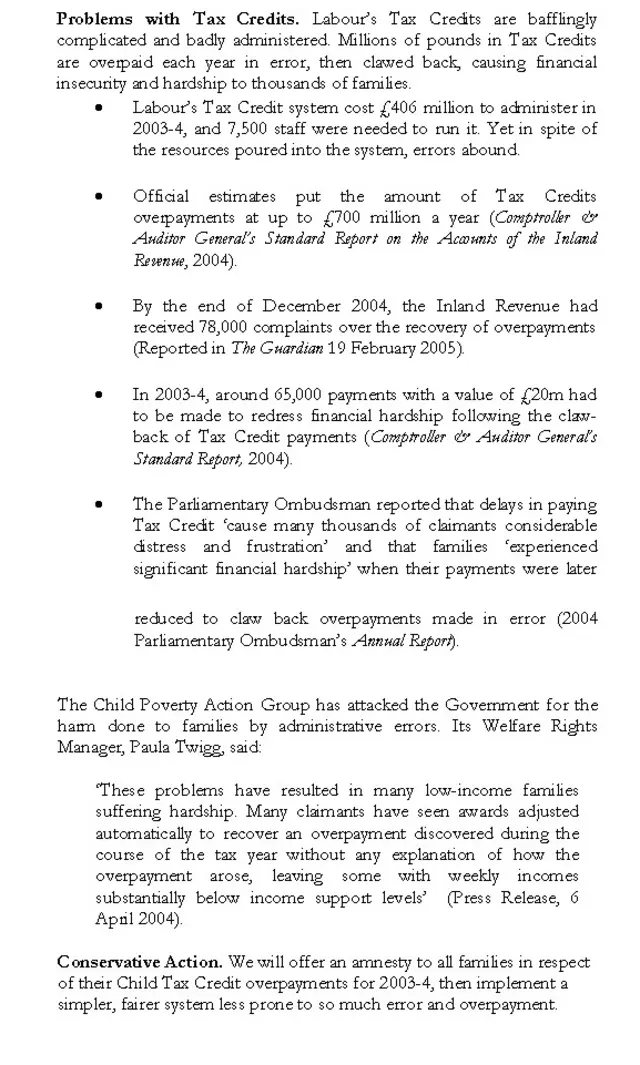 Image source, Conservative Party
Image source, Conservative PartySo, the criticism was not of excessive largesse, rather of administrative incompetence and the hardships facing some households that were overpaid tax credits that they then had to return.
Given the expected level of cuts to tax credits (back to 2003 levels, according to Government briefings), it remains to be seen whether the Conservatives will admit that there will be any "hardship" for those affected.
As a footnote, the Conservatives did have another distinctive policy on tax credits in the 2005 election campaign, but it was not to cut them. Instead, it was to introduce a new tax credit to support flexible childcare.
Duncan Weldon and Jess Brammar in Athens
Richard Watson, Newsnight correspondent

“Better late than never” will be the reaction of some to the news today that a Europe-wide police team from Europol is being formed to track social media accounts used for Islamic State propaganda. The so-called Islamic State – under its former names of Isis or Isil – have been dominating the information war on the Internet for nearly two years.
Newsnight interviewed one of the “early adopters” in November 2013 – Ifthekar Jaman from Portsmouth. He told me he was on “jihad” in a Skype call from near the Syrian frontline. Jaman had grown-up in the UK and went to college here. He worked in a customer service centre. He was killed fighting, just two weeks after our interview.
Jaman is a case in point. He was a prolific user of social media, in some ways a poster-boy for violent jihad. Some of his friends from Portsmouth followed him to Syria. Several have died.
It appears to be dawning on some that the number of western Europeans being drawn to life in the Caliphate is not being diminished by brutal reality on the ground. You’d have thought that mass beheadings, especially of non-combatants, would pollute the waters a little. But it seems not.
One of my sources told me the numbers did start to wane several months ago because the aid convoys to Syria were drying-up. That’s not to say there were no genuine convoys, but there’s doubt that some were being used to smuggle fighters over the Turkish-Syrian border.
But the flow of western recruits has been maintained using other routes. Take the sisters from Bradford who diverted, it seems, from pilgrimage in Saudi Arabia. It’s hard to second-guess that. Europol, the European police agency, estimates that 5000 EU citizens are now in IS territory.
In the UK, the Security Service MI5 assess that around 700 Brits have gone to fight and half have returned. But one well-placed police source told me this is a big underestimate. The true figure is far higher.
So, will choking-off the propaganda work? That assumes that there are “waverers” who just might decide to stay at home if it wasn’t for the material they see online. There are some in this category, perhaps, but I doubt there are than many. Most fighters are well-versed in “jihadi” arguments and are used to going against the flow. Indeed, that is part of the attraction. They believe that most mainstream thinkers have sold-out and nothing should deviate them from the “true” path.
Many subscribers to the Islamic State are converts to Islam who may not have the cultural and religious hinterland to put IS’s religious claims into context. Indeed, for most potential supporters – converts or not - there is no context, just absolutism, and that is the core problem. The IS target audience doesn’t believe in context or nuance. Supporters simply assert they are religiously correct and that violent tactics of terror are justified because the end goal is creating and sustaining an “Islamic state”.
Ultimately, targeting the internet is a necessary, if rather belated, first step. But the true battle is one of ideas. Winning that could persuade potential recruits to change their minds before they leave.
 Duncan Weldon
Duncan Weldon
Economics correspondent in Athens
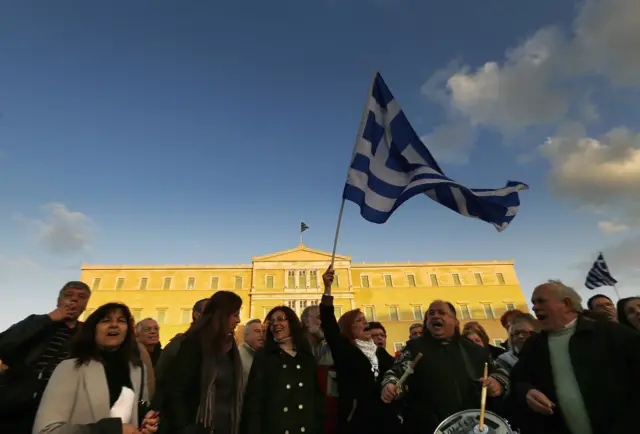 Image source, Reuters
Image source, ReutersThe can looks to have been kicked again. Probably only a short kick to later in the week, when it may be given a longer wallop out for another six months with a bailout extension.
The Eurogroup of finance ministers have broadly welcomed the new Greek proposals but say they came too late for a full technical assessment to be carried out.
For the first time in months Eurozone officials are talking warmly about the chances of a deal being done soon. So, progress then but a delay nonetheless. And that delay brings risks.
The first is financial, Greek banks are still bleeding deposits with the ECB extending support three times in five days. That is likely to become four times in a matter of hours. But at the moment this financial risk seems containable. Whilst a messy break down in the talks would probably have sparked faster deposit flight, the signs of progress may calm nerves. And the ECB is highly unlikely to pull the plug whilst talks continue. Having kept the Greek banks afloat through months of difficult talks, it would be odd to stop now a deal looks doable.
The real risk is domestic politics, both in Greece and in the creditor countries. The deal that looks to be on the table will be a difficult sell within Syriza (where it will be seen as harsh and tough) and a difficult sell in Northern Europe (where it won't be seen as tough enough).
It would have been a much easier political task to sell a sealed deal, the delay may allow domestic opponents to try and unpick elements of it in the days ahead.
Today was supposed to be decision day. The decision that has been made though, is to delay the decision. Again.
James Clayton
Here’s Newsnight’s Sue Lloyd Roberts on the VictoriaDerbyshire Show talking about her search to find a stem cell donor. If you’re 30 or under and at New Broadcasting House today do come along before 4pm and you can join the stem cell donor register.
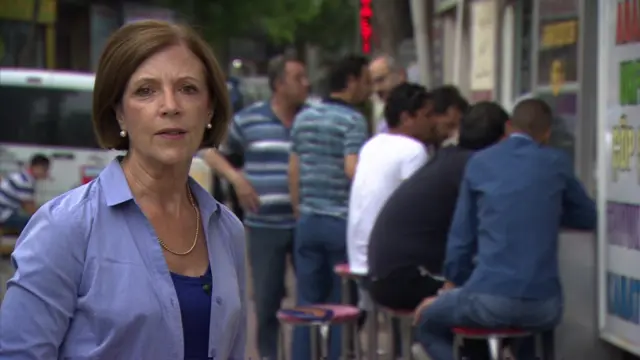 Image source, SLR
Image source, SLRSue Lloyd Roberts
 Duncan Weldon
Duncan Weldon
Economics correspondent in Athens
Here's a list of what look to be the Greek concessions since last week. In case you don't have a microscope to read the small print this is what the tweet says:
" *A broad based VAT rates, inclusive of some foodstuffs and restaurants by 10%;
*An elimination of early retirement benefits from 2016 to be phased in over three years;
*Most importantly, a broad-based increase in pension contributions, reported to be 2% for wage-earners and 2% for corporations;
*An increase in a special "healthcare" charge on pensions equivalent to an across the board cut of 1% in main and 5% cuts in supplementary pensions;
*Cuts in defence spending;
*Increases in corporate tax rates to those firms earning more than 500mio EUR profits;
*Increases in income tax rates to those earning above 30k EUR."
They are large and represent the crossing of several red lines. Why the change? The simple answer is: the banks.
The European Central Bank has now had to extent emergency support three times in five days. The Greek government are now negotiating with their creditors whilst knowing that they have the ability to collapse their banking system if no deal is reached.
That isn't a great position of strength from which to bargain.
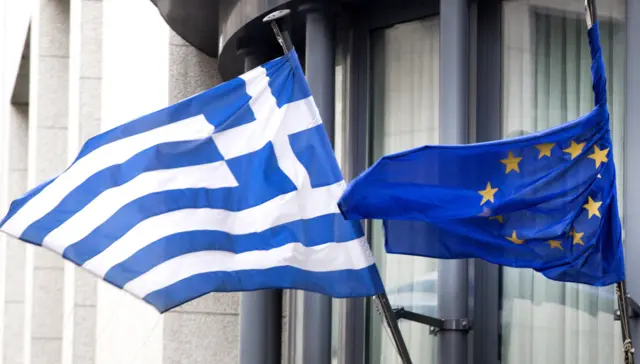 Image source, AP
Image source, AP Duncan Weldon
Duncan Weldon
Economics correspondent in Athens
 Allegra Stratton
Allegra Stratton
Newsnight Political Editor
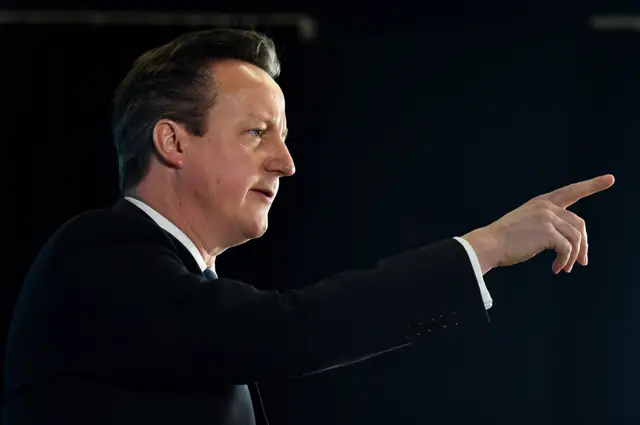 Image source, AFP/Getty Images
Image source, AFP/Getty ImagesThis week ends for the PM with an important EU summit... So it will start with a big speech on domestic policy - the PM's team is keen that the emphasis on Europe in the early part of this parliament does not dominate the whole of his second term.
Today David Cameron will address welfare. The development this weekend is an unambiguous commitment from George Osborne and Iain Duncan Smith that they are doing the full £12bn of welfare cuts. This may seem to you to be a little dog-bites-man, given it was in their manifesto... Except that there had been deep disquiet in Tory ranks about doing the full £12bn. The first month after the Tory election victory was characterised by figures in all wings of the Tory party searching for a way to shelve the pledge. It was the Chancellor that was keenest on doing the full thing. He has won, it seems. Though the cuts will be staggered between the Budget, and the Autumn spending review.
Today we are getting rhetoric from the PM rather than detail but he seems to be making public the idea Newsnight broke last week - that some £5-£8bn of tax credits are on the table. We reported that the option being looked at is to take tax credits back to the level they were last at in 2003-2004 when Gordon Brown began to significantly ramp them up. Tories think this regime has "papered over the cracks" of poverty in this country rather than exposed it.
Shortly David Cameron will say there is "complacency in how we approach the issue of low pay” and an end to the "merry go round" where people are taxed then given money back in tax credits.
When we did this story last Wednesday there was a sharp intake of breath from analysts we contacted. So many of those affected were in work, they said, that it would be an attack on the working people the Tories are now targeting with their "One nation Conservatism". And indeed it is the case that working people will be hit.
I wonder if the missing part of the jigsaw will be new responsibilities placed on companies to pay nearer to a living wage? Tory sources make clear to me that firms should be paying more now that Britain's economy is healthier. Even Labour politicians admit that by the state topping up wages during the new Labour years, firms were allowed to get away with paying less. Recently Campaign group Citizens UK showed that workers at big firms in the UK had also received about £11bn by state tax credits. This is why people charge that big firms have been "subsidised".
Critics point out that cutting tax credits would plunge 300,000 children into poverty. This is a figure from the Institute for Fiscal Studies. Many Tories say this wouldn't be the case if firms stepped in to pay a higher wage. But there is also a view inside government that definitions of child poverty are also wrong. Former director of Policy Exchange, and one of the sharpest analysts of welfare, Neil O'Brien, has been the Chancellor's policy adviser since the end of 2012. In 2010 and well before he went in to Number 11, he wrote this and it is interesting reading: Find it here, external.
I know the Chancellor would like to unwind Gordon Brown's tax credit regime. We'll see in the Budget in a fortnight if he does. And if he does, exactly how.
 Duncan Weldon
Duncan Weldon
Economics correspondent in Athens
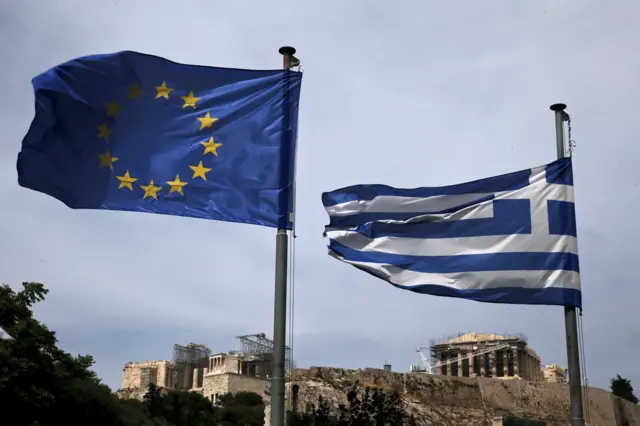 Image source, Reuters
Image source, ReutersGreek debt talks with EU leaders reach a critical stage tonight
Last night the Chief of Staff, of the European Commission, Martin Selmayr tweeted that: "New Greek proposal received @JunckerEU, @Lagarde,@ecb. Good basis for progress at tomorrow's EuroSummit. In German "eine Zangengeburt."
It means a birth using forceps. And that's what seems to be happening in Brussels. The delivery of the deal is fraught and difficult but progressing.
Markets are up strongly on the suggestion of a compromise. Greece appears to be prepared to strike a six month extension to its current arrangements and to cross some "red lines" on pensions and tax in return for immediate funding and possibly future talks on debt relief.
Meanwhile in Athens the image of the day is foreign journalists filming cash machines. Billions of euros have been withdrawn, but so far today there isn't any sign of panic.